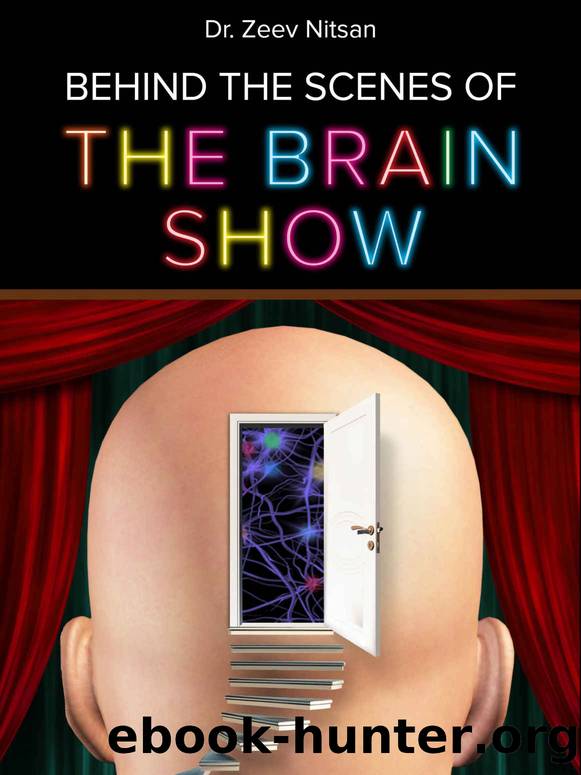The Brain Show — Behind the Scenes: What is Going on Inside Our Brain While We are Living Our Life by Zeev Nitsan

Author:Zeev Nitsan [Nitsan, Zeev]
Language: eng
Format: epub
Published: 2017-03-04T05:00:00+00:00
Aspects of Thinking Failures
The Danger of Permanent Residency in “La La Land”
The sweeping tendency to interpret reality appearances through “rose-colored glasses” is like sprinkling powdered sugar on our memories. This tendency is also called the “Pollyanna syndrome,” after the literary character who never notices a dark cloud in the sky of her life. Such a tendency might carry calamity seeds of self-deceit. Gambling agents are grateful for this tendency every day.
In a light spirit of wishful thinking that tends toward too-optimistic interpretation of reality, a common, humoristic saying in bachelorhood tradition is “A woman who walks with a dog is lonely, while a woman who walks without a dog simply forgot it at home”—therefore, the duty of every decent bachelor is to try to ease the widespread loneliness.
In previous times in history, life presented to our species a much narrower scope of options. The amount of information we needed in order to solve our day-to-day problems was smaller than today. The complexity of required processing was also usually lower compared to what is required from the brain of an average twenty-first century Homo sapiens.
Complex probabilities were not usually required in previous times in history; thus, our brain is not equipped with a set of mental tools designed for complex statistic processing.
Often, probabilistic discretion does not come naturally to our brain, and so the task of statistic inference is sometimes difficult for it to perform.
We have difficulties with rational probabilistic thinking in uncertain conditions. When we consider our alternatives, we tend to make decisions according to heuristics.
An anecdote that can illustrate the obstacles of predicting the future and the capricious nature of destiny is told about a doctor who shared with his colleague his conflict related to terminating a woman’s pregnancy. It happened at the end of the eighteenth century. The woman’s husband had syphilis, and she had tuberculosis; their first child was born blind, the second died at a young age, the third one was born deaf, and the fourth had tuberculosis as well. The reaction of the colleague was to say, “I would terminate the pregnancy.” The doctor then said, “If I had, I would have sentenced Beethoven to death.”
Our brain is directed at the sensational and dedicates to such events attention and processing resources that are very much exaggerated according to statistic logic and risk management philosophy, which is based on common sense. All types of journalism thrive as a result of this tendency of our brain.
Often we are caught in the trap of illusionary correlations, and then noncausal correlations are perceived as causal ones.
“In-depth interpretation” sometimes adds an artificial dimension that does not exist in its absence. Many of our deeds, especially habitual reactions, lack the symbolic depth that is sometimes linked to them. Often our actions are the result of a momentary condition of the brain’s parallelogram of forces, when the action patterns of neurons that were resurrected at a certain moment lack the depth dimension that is sometimes added to them in retrospect as an interpretive act.
Download
This site does not store any files on its server. We only index and link to content provided by other sites. Please contact the content providers to delete copyright contents if any and email us, we'll remove relevant links or contents immediately.
Professional Troublemaker by Luvvie Ajayi Jones(29651)
Whiskey Words & a Shovel I by r.h. Sin(19390)
Rewire Your Anxious Brain by Catherine M. Pittman(18643)
Healthy Aging For Dummies by Brent Agin & Sharon Perkins RN(17038)
Cat's cradle by Kurt Vonnegut(15335)
Talking to Strangers by Malcolm Gladwell(13347)
The Art of Thinking Clearly by Rolf Dobelli(10453)
They Both Die at the End by Adam Silvera(9807)
The 5 Love Languages: The Secret to Love That Lasts by Gary Chapman(9784)
Doing It: Let's Talk About Sex... by Hannah Witton(9275)
The Compound Effect by Darren Hardy(8944)
Thirteen Reasons Why by Jay Asher(8893)
Goodbye, Things by Fumio Sasaki(8575)
Wonder by R.J. Palacio(8570)
Tools of Titans by Timothy Ferriss(8365)
Atomic Habits: Tiny Changes, Remarkable Results by James Clear(8326)
Becoming Supernatural by Dr. Joe Dispenza(8200)
Wonder by R. J. Palacio(8097)
Change Your Questions, Change Your Life by Marilee Adams(7759)
